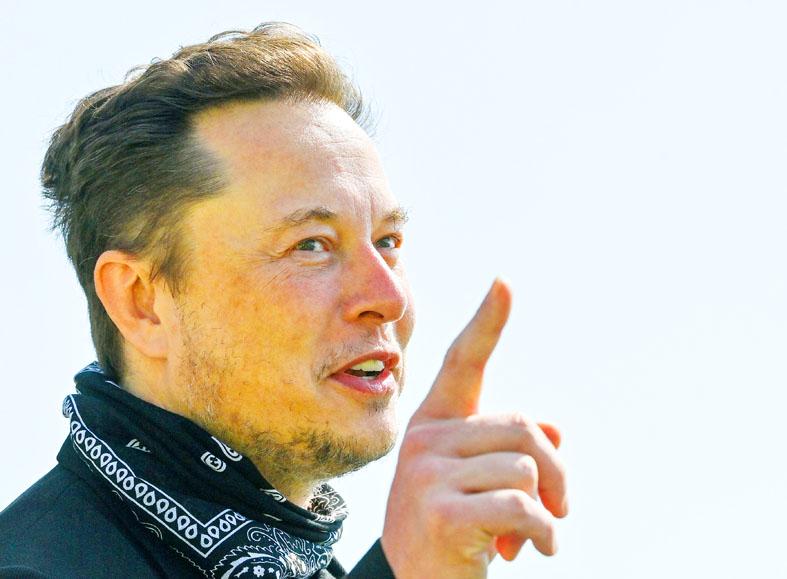Tesla Inc CEO Musk on Thursday said the electric automaker would probably launch a “Tesla Bot” humanoid robot prototype next year, designed for dangerous, repetitive or boring work that people do not like to do.
Speaking at Tesla’s AI Day event, the billionaire entrepreneur said the robot, at about 173cm tall, would be able to handle jobs from attaching bolts to cars with a wrench, to picking up groceries at stores.
The robot would have “profound implications for the economy,” Musk said, addressing a labor shortage.

Photo: Reuters
He said it was important to make the machine not “super-expensive.”
The AI Day event came amid growing scrutiny over the safety and capability of the company’s “Full Self-Driving” advanced driver assistant system.
Musk did not comment on that scrutiny over the safety of Tesla technology, but said that he was confident of achieving full self-driving with higher safety than humans using current in-car cameras and computers.
US safety regulators earlier this week opened an investigation into Tesla’s driver assistant system because of accidents where Tesla cars crashed into stationary police cars and fire trucks.
Two US senators have also called on the Federal Trade Commission to investigate Tesla’s claims for its “Full Self-Driving” system.
At the event on Thursday Tesla also unveiled its in-house designed chips, Dojo, to help develop its automated driving system.
Musk said Dojo would be operational next year.
He said Tesla would also introduce new hardware for its self-driving computer for its Cybertruck electric pick-up truck in “about a year or so.”
Tesla last month pushed back the launch of its much-anticipated Cybertruck from this year, without giving a timeframe for its arrival on the market.
Some questioned whether Musk, who has frequently touted technology advances at showpiece events only to scale plans down later on, would be able to come good on his aims for the robot.
“Is the ‘Tesla Bot’ the next dream shot to pump up the hype machine?” said Raj Rajkumar, professor of electrical and computer engineering at Carnegie Mellon University.
“I can safely say that it will be much longer than 10 years before a humanoid bot from any company on the planet can go to the store and get groceries for you,” he said.

SETBACK: Apple’s India iPhone push has been disrupted after Foxconn recalled hundreds of Chinese engineers, amid Beijing’s attempts to curb tech transfers Apple Inc assembly partner Hon Hai Precision Industry Co (鴻海精密), also known internationally as Foxconn Technology Group (富士康科技集團), has recalled about 300 Chinese engineers from a factory in India, the latest setback for the iPhone maker’s push to rapidly expand in the country. The extraction of Chinese workers from the factory of Yuzhan Technology (India) Private Ltd, a Hon Hai component unit, in southern Tamil Nadu state, is the second such move in a few months. The company has started flying in Taiwanese engineers to replace staff leaving, people familiar with the matter said, asking not to be named, as the

The prices of gasoline and diesel at domestic fuel stations are to rise NT$0.1 and NT$0.4 per liter this week respectively, after international crude oil prices rose last week, CPC Corp, Taiwan (台灣中油) and Formosa Petrochemical Corp (台塑石化) announced yesterday. Effective today, gasoline prices at CPC and Formosa stations are to rise to NT$27.3, NT$28.8 and NT$30.8 per liter for 92, 95 and 98-octane unleaded gasoline respectively, the companies said in separate statements. The price of premium diesel is to rise to NT$26.2 per liter at CPC stations and NT$26 at Formosa pumps, they said. The announcements came after international crude oil prices

SinoPac Financial Holdings Co (永豐金控) is weighing whether to add a life insurance business to its portfolio, but would tread cautiously after completing three acquisitions in quick succession, president Stanley Chu (朱士廷) said yesterday. “We are carefully considering whether life insurance should play a role in SinoPac’s business map,” Chu told reporters ahead of an earnings conference. “Our priority is to ensure the success of the deals we have already made, even though we are tracking some possible targets.” Local media have reported that Mercuries Life Insurance Co (三商美邦人壽), which is seeking buyers amid financial strains, has invited three financial

CAUTION: Right now, artificial intelligence runs on faith, not productivity and eventually, the risk of a bubble will emerge,’ TIER economist Gordon Sun said Taiwanese manufacturers turned more optimistic last month, ending a five-month streak of declining sentiment as concerns over US tariffs, currency volatility and China’s overcapacity began to ease, the Taiwan Institute of Economic Research (TIER) said yesterday. The manufacturing business confidence index rose 1.17 points from June to 86.8, its first rebound since February. TIER economist Gordon Sun (孫明德) attributed the uptick to fading trade uncertainties, a steadier New Taiwan dollar and reduced competitive pressure from Chinese producers. Taiwan’s semiconductor industry is unlikely to face significant damage from Washington’s ongoing probe into semiconductors, given the US’ reliance on Taiwanese chips to power artificial